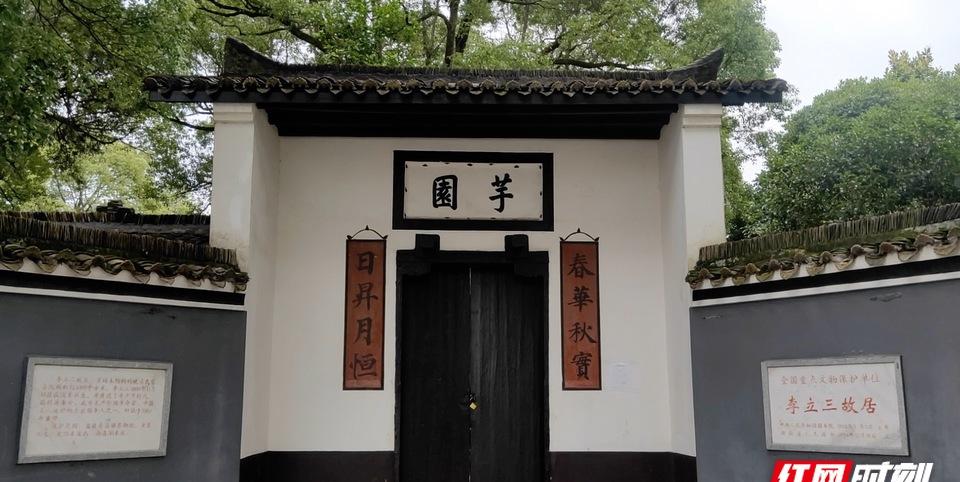00:00
Video loading...
Editor's note: Romantic as a poet, but as tough as steel, the blood-colored romance on the red hot soil is vividly displayed in the first poem that is either generous or tragic. Hunan, the main birthplace and source of the Chinese revolution, the surging revolutionary wave, the arduous revolutionary struggle, the brilliant revolutionary figures, and countless moving stories have made this red hot land have inexhaustible motivation. On the occasion of the 100th anniversary of the founding of the Communist Party of China, the red net takes you to feel the red mountains and rivers refined from blood and fire from those poems that are beautiful or miserable but have never given up their faith and ideals.
Red Net Moment reporters Ren Ye, Chen Minying, and Wang Jinwen reported from Liling
Good temperament bull fight,
Like burning the national vendetta.
Poetry books never end,
Cast a pen to follow the class.
In 1917, when he was a teenager, Li Lisan wrote this "New Year's Day Test Poem" in front of the pen to express his desire to save the country. Li Lisan is one of the outstanding leaders of china's workers' movement, he has always cared for the well-being of workers, and "seeking long-term happiness for workers" in the new Chinese labor cause is Li Lisan's lifelong insistence.

Former residence of Li Lisan.
Concern for the Well-being of Workers The predecessor of the "trade union" was established
Born in 1899 in Liling to a family of scholars, Li Lisan had the ambition to save the country and the people since he was a child, and published articles under the pseudonym "Worried Guozi" in middle school. In 1919, Li Lisan went to France to work and study, and after returning to China in December 1921, he joined the Communist Party of China, and was subsequently sent to Anyuan to engage in the workers' movement.
After going to Anyuan, Li Lisan found that the workers here were digging coal underground without personal protection, which inspired his determination to fight. So he founded a civilian school in Anyuan to teach workers to read and write. In the process of opening the school, he also had extensive contacts with the workers in the name of home visits, propagated the spirit of unity and advanced Marxist ideas to the workers, and soon absorbed a large number of advanced workers to join the Socialist Youth League. Later, it was with the joint efforts of these members that Li Lisan founded a practice school. The first three words he taught the workers were "work, man, and heaven", and he said that the workers were good men who stood up to the heavens and the earth, so as to stimulate the consciousness of the workers. Li Lisan then established the Workers' Club and served as its director. The workers' club is the predecessor of our present "trade union".
In 1922, Li Lisan founded China's earliest workers' party branch, the Anyuan Road Mining Branch of the Communist Party of China, in the train house. On September 14, together with Liu Shaoqi, he organized and led the Anyuan Road Mine Strike. More than 13,000 road miners chanted the slogan "Once a cow and a horse, now I want to be a man." This general strike also won the victory of "uninjured and undefeated" and opened up a new situation in the Chinese workers' movement.
Not afraid of life and death Three memorial services in five years
In 1927, the first civil revolutionary war was defeated, and Li Lisan, Deng Zhongxia, and Tan Pingshan took the lead in proposing the Nanchang Uprising to the Party Central Committee. At that time, Li Lisan served as a member of the Nanchang Uprising Revolutionary Committee, a member of the Peasants' and Workers' Committee, and the Director of the Political Protection Department. During this period, the troops led by Li Lisan were attacked by three enemy regiments near Ruijin, Jiangxi, and the battle was extremely difficult and tragic, and they also lost contact with the large troops. At that time, everyone mistakenly believed that Li Lisan had died, and Zhou Enlai personally presided over the memorial service for Li Lisan. While his comrades-in-arms were mourning, Li Lisan returned safely with a few people. In just 5 years, Li Lisan has experienced 3 memorial services like this. His courageous spirit of going forward and not being afraid of life and death has also left a very special mark and logo on the history of the Communist Party of China.
Bronze statue of Li Lisan.
After the founding of New China, Li Lisan continued to preside over the work of the All-China Federation of Trade Unions, successively serving as secretary of the CPC Central Working Committee and vice chairman of the All-China Federation of Trade Unions. In June 1950, he presided over the promulgation and implementation of the Trade Union Law of the People's Republic of China, which was one of the earliest important laws promulgated and implemented after the founding of New China, and clearly stipulated the status and responsibilities of trade union organizations in the new democratic country.
Li Lisan not only made important contributions to the cause of the liberation of the Chinese people, but also had a far-reaching impact on the establishment and development of China's trade union cause and the cause of labor security; he was loyal to the party and the people, bravely forged ahead against the enemy's struggle, was frank and frank, and took the overall situation into consideration, inspiring us to draw on the strength to forge ahead, be loyal to the party, care for the masses, be close to the people, and always maintain full enthusiasm for work!